|
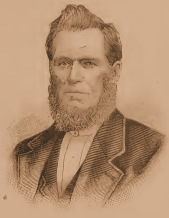 W. T. CRANE ----Was a native of Pennsylvania,
was born in the year 1829, in Green County, where he
passed his boy-hood days until sixteen years of age. In
1845 he went to Illinois, and was engaged in farming
until he came to the State of Nevada, in 1863. He first
settled in Austin, Lander County, adding stock-raising
to his former business, in which he has been
successful.
In 1867 he moved to his present location South
Fork Valley, Elko County, where he has since resided,
engaged in the same business. He has held the office of
Postmaster at Coral Hill, also that of Justice of the
Peace. W. T. CRANE ----Was a native of Pennsylvania,
was born in the year 1829, in Green County, where he
passed his boy-hood days until sixteen years of age. In
1845 he went to Illinois, and was engaged in farming
until he came to the State of Nevada, in 1863. He first
settled in Austin, Lander County, adding stock-raising
to his former business, in which he has been
successful.
In 1867 he moved to his present location South
Fork Valley, Elko County, where he has since resided,
engaged in the same business. He has held the office of
Postmaster at Coral Hill, also that of Justice of the
Peace.
On the first of January, 1857, he
was married to Eliza Wallace, a native of Sangamon
County, Illinois, their union proving fruitful, eleven
children having been born to them, ten of whom are now
living. The following are the names of the children, and
the date of their birth: Geo. W. W., born January 5,
1858; Jessie Rae, born March 26, 1860; Knox A., born
November 15, 1861; Mary E, born April 18, 1865; Lizzie
L., born January 28, 1867; Henry Shepherd, born February
14, 1869; Emma Frances, born January 28, 1871; Charles
Humboldt, born December 20, 1872; Andrew B., born May
15, 1875; Jennie B., born October 27, 1877; James M.,
born May 11, 1879. Jessie Rae, the second child, died
August 6, 1861.
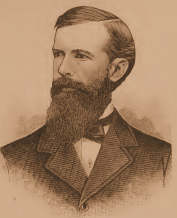 HENRY MARTIN GRANT -----Son of Cyril R. and
Abby Fales (Mason) Grant, was born in Woonsockett, Rhode
Island, September 4, 1812. He received a thorough
education, his intention being to adopt the profession
of civil engineer.
At the age of eighteen years he left school, and
was occupied in various clerical duties until 1863, when
he engaged as clerk and accountant for a copper mining
company, in the Lake Superior country. This he continued
until 1866, when he came to the Pacific Coast in the
interests of a New York company, who were developing
mines in Nye County in this State. He remained in their
employ two and a half years as chief accountant. HENRY MARTIN GRANT -----Son of Cyril R. and
Abby Fales (Mason) Grant, was born in Woonsockett, Rhode
Island, September 4, 1812. He received a thorough
education, his intention being to adopt the profession
of civil engineer.
At the age of eighteen years he left school, and
was occupied in various clerical duties until 1863, when
he engaged as clerk and accountant for a copper mining
company, in the Lake Superior country. This he continued
until 1866, when he came to the Pacific Coast in the
interests of a New York company, who were developing
mines in Nye County in this State. He remained in their
employ two and a half years as chief accountant.
In 1868, he returned to the
East and was married to Miss N. Arda Rorison,
daughter of D. H. Rorison, of Ypsilanti, Michigan. Mrs.
Grant was born in Seneca County, New York, a lady of
unusual force of character, excellent judgment and
cultivated tastes; and, after a life of usefulness,
departed this life May 31, 1878.
Upon the return of our
subject to this coast, he accepted a position with the
Owyhee Mining Company as accountant for the working of
the Poorman Mine at Silver City, Idaho, where he
remained until 1870, at which time he engaged in the
banking business in Mountain City, Elko County, Nevada,
for himself. He followed this business for three years,
but failing to be remunerative it was abandoned, leaving
him somewhat embarrassed; but through his extra
exertions, and pure self-denial, he paid his
indebtedness dollar for dollar. In 1873, he engaged as
cashier in a banking house at Elko, Elko County, Nevada,
and there continued until 1880, when he was appointed,
by Wells, Fargo & Co., as their agent in the same
town, which position he now holds, and conducts in
connection therewith, a general insurance business.
In 1878, he received the Republican
nomination for County Treasurer, and was elected by a
majority of 627 votes, this in a strongly Democratic
county, being a strong indorsement of his standing in
the community. Mr. Grant is, at present, also largely
interested in stock-raising and farming in Ruby Valley,
Elko County. He has an interesting family of three
children: Harry M., born January 15, 1872; Adele, born
March 31, 1874; and Sarah A., born July 15,
1875.
 JOHN S. MAYHUGH -----The subject of this
sketch, is one of the pioneers of Nevada, he was born in
1830, in Dickson Township, Cumberland County,
Pennsylvania. In the year 1850 he came to California and
located in Nevada County, near Grass Valley, where he
followed quartz and placer mining and the lumber
business until 1859, when he moved to the then Territory
of Nevada, settling first in Virginia City, where he
remained about one year, and upon the discovery of the
mines in Esmeralda County, he went thither, and took an
active and prominent part in the politics of the times,
being chairman of the committee that reported strong
resolutions in favor of the Union, during the exciting
times succeeding the breaking out of the Rebellion. JOHN S. MAYHUGH -----The subject of this
sketch, is one of the pioneers of Nevada, he was born in
1830, in Dickson Township, Cumberland County,
Pennsylvania. In the year 1850 he came to California and
located in Nevada County, near Grass Valley, where he
followed quartz and placer mining and the lumber
business until 1859, when he moved to the then Territory
of Nevada, settling first in Virginia City, where he
remained about one year, and upon the discovery of the
mines in Esmeralda County, he went thither, and took an
active and prominent part in the politics of the times,
being chairman of the committee that reported strong
resolutions in favor of the Union, during the exciting
times succeeding the breaking out of the Rebellion.
From that time to the present
he has been an active and consistent worker for the
Republican party; has represented Esmeralda County in
the State Legislature five regular, and one extra,
sessions, from 1864 to 1869. In the latter year he
removed to Elko County, and was Justice of the Peace for
Elko Town ship for two years, when he was appointed
Register of the United States Land Office at Elko, by
President U. S. Grant. This position he held five years,
at the end of which period the offices of Eureka and
Pioche were consolidated with his office and located at
Eureka, as a matter of economy on the part of President
Hayes' administration.
In 1878 he was elected to the
Assembly, by a majority of 303 in a Democratic county
that gave the Democratic candidate for Governor a
majority at the same election of 352. During the session
of the Legislature he was the recognized leader of the
House, and was chosen a member of the Board of Regents
of the State University for a term of four years, of
which institution he was one of the founders. His
practical experience in the selection of Government and
State lands, and the procuring of titles there to,
places him in the front rank of that profession in which
he is at present engaged.
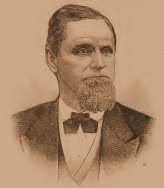 COL. J. B. MOORE---Was born in the town of
Piermont, Grafton County, New Hampshire, on the
twenty-eighth of October, 1828. He remained there until
1840, and during that time received a limited education,
such as can be obtained in the common schools, In the
last named year he went to Boston, Massachusetts, where
he cast his first vote for President James K. Polk. COL. J. B. MOORE---Was born in the town of
Piermont, Grafton County, New Hampshire, on the
twenty-eighth of October, 1828. He remained there until
1840, and during that time received a limited education,
such as can be obtained in the common schools, In the
last named year he went to Boston, Massachusetts, where
he cast his first vote for President James K. Polk.
In 1846 he enlisted in the
First Massachusetts Regiment of Volunteers, and served
through the Mexican War. Came to California in 1852,
where he served seven consecutive years on the San
Francisco police force. In 1861, at the breaking out of
the Rebellion, he raised a company of volunteers for the
Third Regiment, of which he was elected Captain. In the month of
October of the same year he was promoted to be
Lieutenant Colonel. In 1863 he came to Nevada, and
commanded Camp Ruby, also Camp Douglas, in Utah; and was
discharged in the month of January, 1865, at his own
request.
Settling in Ruby Valley, he engaged
in farming and stock-raising, and still resides in the
valley. He raised the first grain in Elko County. In
1869 was elected to the State Senate on the Republican
ticket by a majority of only one vote, against a
Democratic majority of 150 in the county. Served in the
fifth and sixth sessions. In 1876 was elected to the
Assembly, being the only Republican elected in the
county. Was Deputy Warden of the State Prison in 1879,
and has held numerous positions of trust in the
county. The
Colonel still continues in single
blessedness.
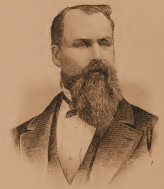 WILLIAM MYERS -----Was born
in Herkimer County, New York State, September 28, 1839,
where he lived until the fall of 1858. He then came to
the Pacific Coast by way of the Isthmus of Panama, and
settled in Contra Costa County, California. WILLIAM MYERS -----Was born
in Herkimer County, New York State, September 28, 1839,
where he lived until the fall of 1858. He then came to
the Pacific Coast by way of the Isthmus of Panama, and
settled in Contra Costa County, California.
He afterwards lived in
various parts of that State until the year 1862, when he
enlisted in Company B, Third Infantry California
Volunteers, Col. P. Edward Connor, commanding. July 12, 1862,
the regiment left California and was stationed in Utah,
where it was engaged in fighting Indians part of the
time. He held the office of Commissary Sergeant of the
Regiment for one year and was then promoted to Second
Lieutenant of Company E.
After about three years service he
resigned and came to Nevada, settling in Ruby Valley,
Elko County, his present location, where he has since
resided. He has a ranch containing 640 acres, and is
quite extensively engaged in stock-raising as well as
being a good farmer. In politics Mr. Myers is a strong
and consistent Republican. Was married March 17, 1869,
to Miss Lottie Mangus, at Herkimer, New York State. They
have two children named Ruby and Mabel, aged
respectively nine and four years.
 G. NONEYMAN ----The subject of this sketch,
was born in Leitrim County, Ireland, in 1833. At the age
of seventeen years he emigrated to the United States and
settled in the city of New York, where he remained until
1856, engaged in a dyeing establishment during most of
the time. G. NONEYMAN ----The subject of this sketch,
was born in Leitrim County, Ireland, in 1833. At the age
of seventeen years he emigrated to the United States and
settled in the city of New York, where he remained until
1856, engaged in a dyeing establishment during most of
the time.
In the last-named year he
came to California by the Nicaragua route. Arriving in
the land of gold, he sought his fortune in the mines,
and after one year's experience on the main Yuba River,
he went to Oregon, where he engaged in farming. From there he
went to Washington Territory, and again took up the
pursuit of mining, and remained until 1861, when he
returned to California.
The Rebellion breaking out about
that time, he was one of the first to enlist in the
defense of his adopted country, joining the Third
California Infantry Regiment, under Colonel Connor, as a
private, in which capacity he served his country only
two months, being elected Second Lieutenant during that
time. His
regiment was ordered to Utah, where he was kept until
the close of the war, having re-enlisted as a veteran in
the meantime. During his four year's service he
commanded a battery of light artillery most of the time.
At the close of the war he was mustered out of service,
and came to Nevada, settling in Clover Valley, Elko
County, his present location, where he has since
resided, engaged in farming and stock-raising. His ranch
is situated eighteen miles south of Humboldt
Wells.
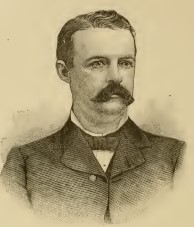 D. R. SESSIONS ------The present State
Superintendent of Public Instruction for Nevada, is a
native of South Carolina, a son of Thomas R. and Jane E.
Sessions, and was born at Georgetown, February 24, 1847.
His scholastic training prior to the war was received in
private schools, but after the breaking out of the
Rebellion he entered the Military Academy of South
Carolina as a cadet. When James Island was evacuated the
South Carolina cadets, of whom young Sessions was one,
acted as the rear guard of the Confederate forces that
withdrew to Raleigh, North Carolina, whence he was
ordered home by the Governor of his State. This was his
only service in the Confederate army, as he was but
eighteen years of age when the war
closed. D. R. SESSIONS ------The present State
Superintendent of Public Instruction for Nevada, is a
native of South Carolina, a son of Thomas R. and Jane E.
Sessions, and was born at Georgetown, February 24, 1847.
His scholastic training prior to the war was received in
private schools, but after the breaking out of the
Rebellion he entered the Military Academy of South
Carolina as a cadet. When James Island was evacuated the
South Carolina cadets, of whom young Sessions was one,
acted as the rear guard of the Confederate forces that
withdrew to Raleigh, North Carolina, whence he was
ordered home by the Governor of his State. This was his
only service in the Confederate army, as he was but
eighteen years of age when the war
closed.
The result to his parents of
that struggle was to leave them impoverished, and no
longer able to render pecuniary assistance to their son
in his efforts to obtain a thorough education. He at
once turned his whole energy in the direction of
achieving success in this line. In Latin a friend gave
him lessons for three weeks. Having no tutor in the
Greek he took it up and successfully prosecuted the
study of that language without a teacher. Eventually he
entered Princeton College, and maintained himself there
for two years, graduating in 1868 with the honor of
pre-excellence in English literature and the modern
languages.
In 1870, he came to Nevada, and
became a teacher and journalist. In 1874, he received
the appointment of Principal of the Nevada State
University at Elko, and remained in charge of that
institution until called, by a vote of the people, to
the poorly paid but important position which he now
occupies.
Mr. Sessions is a married man, his wife being a
daughter of C. N. Noteware, who was at one time Nevada's
Secretary of State, and has been from pioneer days one
of her prominent men.
 G. W. SHEPARD ----Is a native of Christian
county, Kentucky, and was born on March 14, 1827. His
parents were farmers, and at the tender age of sixteen
years he commenced the battle of life for himself. In
1845 he went to New Orleans, Louisiana, and entered the
employ of a wholesale firm as salesman. The breaking out
of the Mexican War caused him to leave his situation,
and he became one of the first volunteers in answer to
the call by General Gaines for six-months men to assist
General Taylor on the Rio Grande. One year later
he returned to Kentucky, and spent the succeeding five
years in the employ of W. W. Western, a stock
dealer. G. W. SHEPARD ----Is a native of Christian
county, Kentucky, and was born on March 14, 1827. His
parents were farmers, and at the tender age of sixteen
years he commenced the battle of life for himself. In
1845 he went to New Orleans, Louisiana, and entered the
employ of a wholesale firm as salesman. The breaking out
of the Mexican War caused him to leave his situation,
and he became one of the first volunteers in answer to
the call by General Gaines for six-months men to assist
General Taylor on the Rio Grande. One year later
he returned to Kentucky, and spent the succeeding five
years in the employ of W. W. Western, a stock
dealer.
In 1853 he started, with a
band of cattle, from Texas for California, and spent the
winter in the Cherokee Country, and completed the
journey the next summer, delivering the stock at
Redding, Shasta County, California. He then remained
with his brother, J. A. Shepherd, at the place then
known as Doak & Bonsell's
Ferry.
In 1858 he commenced
merchandising at same place, now known as Shepherd's
Ferry, on the San Joaquin river, in San Joaquin County.
In the spring of 1866 he closed out his business at that
place, and, with a large stock of goods and a band of
horses, went to Virginia City, Montana, disposing of
them at a decided advantage, and in the fall returned to
California. In the spring of 1868 he came to Nevada and
settled in the valley of the south fork of the Humboldt
River, in Elko County. The next fall he commenced to
grade what is known as the Elko and Hamilton Toll-road,
the first road of the kind in eastern Nevada, and for
six months after its completion was a bonanza, but Hill
Beachey constructed an opposition route running parallel
with it and the bonanza ceased to exist. After the White
Pine excitement was over his attention was turned to
stock-raising, a business he still follows.
In the early organization of Elko
County he was elected County Treasurer, and he has been
twice elected to the State Senate, having two years of
his present term yet to serve, and rejoices in the fact
that he was born a Democrat and has never sold his
birthright. His nominations at the hands of his party
have been without opposition, and the journals of the
State Senate reveal a record of his unvaried hostility
to monopolies that in itself speaks volumes. It is safer
to trust a man's record than his
promises.
 T. N. STONE ----Is a native of Lester,
Worcester County, Massachusetts, and first beheld the
light of day on the fourth of February, 1834. Five years
of his life were spent in the town of Lester, when his
parents moved to near Rochester, New York. He was raised
on a farm, his parents being tillers of the soil. At the
age of eighteen he entered the Brockport Collegiate
Institute, where he pursued his studies for two years,
and then attended the State Normal School at Albany, and
graduated in 1855.
Soon after graduating he became Professor in the
Fergusonville Academy, and the next year removed to
Shawneetown, Illinois, where he followed the profession
of teacher until the spring of 1859, when he crossed the
plains to California. T. N. STONE ----Is a native of Lester,
Worcester County, Massachusetts, and first beheld the
light of day on the fourth of February, 1834. Five years
of his life were spent in the town of Lester, when his
parents moved to near Rochester, New York. He was raised
on a farm, his parents being tillers of the soil. At the
age of eighteen he entered the Brockport Collegiate
Institute, where he pursued his studies for two years,
and then attended the State Normal School at Albany, and
graduated in 1855.
Soon after graduating he became Professor in the
Fergusonville Academy, and the next year removed to
Shawneetown, Illinois, where he followed the profession
of teacher until the spring of 1859, when he crossed the
plains to California.
During the ensuing eleven
years he was a miner and school teacher at Weaverville
and Yreka, and held the position of County
Superintendent of Schools for Siskiyou County for seven
years. In 1870 he came to Nevada, and located at Elko,
Elko County, where he taught school for two years. In
1872 he received the appointment of Postmaster at Elko,
and became engaged in mercantile pursuits in the same
town. The
office was held by him until the fall of 1876 when he
resigned, and was elected to the State Senate. During
the session of 1879 he was elected one of the Board of
Regents of the State University, and was chosen
President thereof, which position he still holds. He was
married September 7, 1856, to Miss Brenda O. Hull, of
Buffalo, New York, and they have four children, three
girls and one boy.
 HON. J. B. TOLLEY ----Is a native of La
Fayette County, Wisconsin. When but thirteen years of
age, he started for California by the overland route in
company with a brother, and being a delicate boy
suffered greatly from the privations consequent upon
such a long and tedious trip. His first occupation after
reaching the land of gold was mining at Placerville, El
Dorado County, California, where he was not favored by
dame fortune, and soon afterwards accepted the position
of clerk in a grocery store at Michigan Bar, Sacramento
County, where he remained during the winter. HON. J. B. TOLLEY ----Is a native of La
Fayette County, Wisconsin. When but thirteen years of
age, he started for California by the overland route in
company with a brother, and being a delicate boy
suffered greatly from the privations consequent upon
such a long and tedious trip. His first occupation after
reaching the land of gold was mining at Placerville, El
Dorado County, California, where he was not favored by
dame fortune, and soon afterwards accepted the position
of clerk in a grocery store at Michigan Bar, Sacramento
County, where he remained during the winter.
In 1851, he emigrated to
Trinity County, in the same State, and again sought his
fortune in the mines on Texas Bar; but the hostility of
the Indians was a great hindrance, and the severity of
the winter of 1852, caused much suffering among the bold
pioneers of that region. In 1853 Mr. Tolley invested in
a pack-train, packing supplies from Colusa to the
northern mines, enduring all manner of hardships in the
interests of his enterprise. In 1854, he returned to the
State of Wisconsin, and devoted himself to a course of
mental culture, attending a select school at Mineral
Point, and afterwards the seminary at Plattsville,
reaping invaluable benefits therefrom.
In 1861 he, in company with his
father, drove a herd of cattle across the plains to
Trinity County, California, and experienced great
trouble from the redskins, having some desperate
skirmishes with them. Upon his arrival in California
again, he pursued mining until 1862, when he returned to
his native State. The next year he again sought the
Pacific Coast, accompanied by his family, this time
taking the route via the Isthmus of Panama. For seven
years he followed his old occupation, that of mining,
when he received the appointment as agent for
Woodruff
Ennor's Stage Line, at Elko, and was afterward
appointed as assistant superintendent of the Leopard
Mill and Mining Company at Cornucopia. In 1876 he was
elected to the Assembly, and in 1878 he removed to
Tuscarora, his present pIace of residence, from whence
he was elected Senator from Elko County, a position he
now holds.
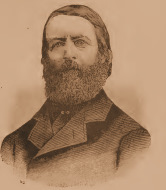 JOHN C. WOOD ----Was born on the twelfth of
January, 1829, near Roseville, Parke County, Indiana. At
the age of nineteen he went to the State of Illinois,
where he remained until 1850, when he came to California
by way of the plains. The haps and mishaps incident to
such a trip were passed in safety, and upon reaching the
Pacific Coast he entered the usual field of labor, that
of mining, which occupation he followed in Calaveras
County for five years, al Angel's Camp and other places.
In 1855 he went to San Joaquin County, where he remained
until 1859, when he removed to the State of Iowa. JOHN C. WOOD ----Was born on the twelfth of
January, 1829, near Roseville, Parke County, Indiana. At
the age of nineteen he went to the State of Illinois,
where he remained until 1850, when he came to California
by way of the plains. The haps and mishaps incident to
such a trip were passed in safety, and upon reaching the
Pacific Coast he entered the usual field of labor, that
of mining, which occupation he followed in Calaveras
County for five years, al Angel's Camp and other places.
In 1855 he went to San Joaquin County, where he remained
until 1859, when he removed to the State of Iowa.
In 1862 he returned to
California, and one year later came to Carson City,
Ormsby County, where he engaged in the lumber business,
remaining until the year 1869. Soon after the excitement
upon the discovery of the mines in White Pine County
broke out, he went to Hamilton, in that county, thence
to Eureka, thence to Spruce Mountain, and in the fall of
1870 located at Clover Valley, Elko County, where he has
since resided, extensively engaged in farming and
stock-raising, his ranch containing 480 acres. During
the past two years he has handled large quantities of
grain with good success.
In 1856 he was married in San
Joaquin County, California, to Miss Eliza Webb, a native
of Tennessee. Their union was blessed with three
children, only one being alive at the present time, a
daughter, married. On the twentieth of April, 1859, his
wife died. During his sojourn in Iowa, he again entered
the connubial state, being married to Miss Jeannette
Simons, at Lebanon, Van Buren County, on the
twenty-first of October, 1860. Eight children have been
born to them, four of whom are now living two boys and
two girls.
The information on Trails to
the Past © Copyright
may be used in personal family history research, with
source citation. The pages in entirety may not be
duplicated for publication in any fashion without the
permission of the owner. Commercial use of any material
on this site is not permitted. Please respect the
wishes of those who have contributed their time and
efforts to make this free site possible.~Thank you! |